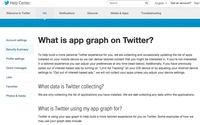
As part of a new “app graph”
initiative, Twitter plans to keep track of the various other apps consumers have on their mobile devices.
Justifying what some might see as a privacy invasion, the social giant says the new policy
will help it build “a more personal Twitter experience” for mobile users.
“We are collecting and occasionally updating the list of apps installed on your mobile device so we
can deliver tailored content that you might be interested in,” Twitter explains in the “Help Center” section of its Web site.
By peeking at users’ apps, Twitter is
promising more refined “who to follow” suggestions, for example, along with more relevant promoted content. Users who are uninterested in such a “tailored experience,” as
Twitter calls it, can opt out by adjusting the Twitter app’s settings.
advertisement
advertisement
Also, Twitter says it won’t keep tabs on users’ app information if they have previously opted out of
“interest-based” ads by turning on “Limit Ad Tracking” on their iOS device, or by adjusting their Android device settings to “Opt out of interest-based ads.”
Before turning on the new app tracking feature, Twitter is promising to notify all users with a prompt.
App tracking is not unprecedented. Facebook collects data on some of the other apps
that users have on their mobile devices, for instance.
Twitter has proven itself to be a particularly friendly platform for advertisers. Indeed, a full 70% of Interbrand 100 companies have at
least 100,000 followers — up from 58% in the fourth quarter of 2013 — according to recent findings from social media analytics and measurement start-up Simply Measured.
Even more
encouraging for Twitter, users appear to be more comfortable than ever engaging with brands on the social network. During the third quarter, Simply Measured recorded 7,266,497 @replies, Retweets, and
favorites of brand tweets — excluding brand-posted retweets and @replies. As a result, engagement with brand tweets was up 83% over the fourth quarter of 2013.
Re/Code was first
to report the new “app graph” initiative on Wednesday.